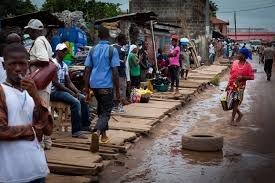Local councils across Sierra Leone are facing a financial drought that threatens to paralyze schools, health centers, and community services after the government failed to disburse their 2025 budget allocations and left arrears from 2024 unpaid.

The Budget Advocacy Network (BAN), a leading civil society watchdog, sounded the alarm last week, warning that the government’s failure to honor its legal obligations is eroding public trust in decentralization and jeopardizing basic services in rural and underserved areas.
“This persistent failure to release funds is crippling local governance,” said Abu Brima, BAN’s chairman. “Councils cannot implement community projects or respond to citizens’ needs. It widens the gap between government promises and actual development.”
A Legal Obligation Since 2004
Sierra Leone’s decentralization laws are clear. Section 46(1)(a) and (b) of the Local Government Act, 2004 requires the central government to allocate a proportion of national revenues to local councils each year, determined by Parliament, to fund devolved services. The Local Government Act, 2022, built on this foundation, tightening rules for intergovernmental transfers and underscoring councils’ rights to timely and adequate resources.
Both Acts make one thing clear: councils are not beggars waiting for handouts. Transfers are a legal right designed to ensure that education, health, water, agriculture, sanitation, and rural development reach every community. When funds are withheld, analysts say, the government is not just failing politically, it is in breach of its laws.
The Numbers Tell a Story of Neglect
The government’s record on council financing has been shaky in recent years. In 2024, councils were allocated NLe 199.8 million but received only NLe 120.9 million, or 61 percent. A further NLe 28.9 million was released between April and July this year as arrears.
For 2025, councils were initially allocated NLe 344.1 million, later revised downward to NLe 287.4 million in the supplementary budget. As of Aug. 11, 2025, however, not a single Leone had been transferred.
These figures are start-up, considering councils account for less than 2 percent of the national budget, according to BAN. The watchdog argues that depriving councils of such a small slice of funding comes at an enormous social cost.
Services at Risk in Every District
The funding gap is already undermining local service delivery. Councils, which are on the front lines of government, cannot meet even their most basic obligations.
Schools struggle to carry out minor repairs or purchase learning materials. Primary health units have no fuel to transport pregnant women in emergencies. Agricultural extension services cannot reach remote farms. Rural communities see their water pumps break down without maintenance. “This failure amounts to an injustice to millions of citizens who rely on councils for critical services,” Brima said.
In Bombali District, council officials say plans to rehabilitate rural feeder roads have stalled. In Kono, schools have delayed the distribution of essential learning supplies. Across the Western Area Rural District, councils are behind on sanitation projects meant to curb cholera outbreaks.
For ordinary citizens, these are not abstract numbers. They are broken promises that affect daily survival.
Government’s Balancing Act
The Ministry of Finance acknowledges the delays but points to broader economic challenges. Officials cite inflation, rising debt service, and declining revenues as reasons for rationing cash.
In defending the 2025 supplementary budget, Finance Minister Ahmed Sheku Fanta Madi Bangura told Parliament the revisions were necessary “to maintain fiscal discipline and ensure macroeconomic stability.” Critics, however, say starving councils is a false economy. Councils’ share of the budget is minimal, while the human cost of collapsing schools and shuttered clinics is incalculable.
“Decentralization was designed to bring government closer to the people,” said one council chairman in the south, who asked not to be named for fear of reprisal. “But without money, councils are empty shells.”
Civil Society and Parliament Push Back
BAN has called for immediate disbursement of outstanding funds and demanded a time-bound, transparent schedule of future transfers. The network comprising organisations such as Action Aid, Christian Aid, Network Movement for Justice and Development, Campaign for Good Governance, Talking Drum Studio, Transparency International, and the Western Area Budget Advocacy and Education Network, wants Parliament’s Public Accounts Committee to increase oversight and ensure that the central government complies with the law.
“The promise of decentralization will remain an illusion unless local governments are empowered with timely and adequate resources to meet the needs of the people,” Mr. Brima said.
Other civil society organizations, including local governance coalitions and anti-corruption campaigners, have echoed BAN’s concerns. They argue that delayed disbursements fuel suspicion of political manipulation and weaken public confidence.
Opposition members of Parliament describe the supplementary budget as “austerity in disguise,” warning that the government risks undermining democratic reforms won over two decades.
Transparency Seen as a Quick Fix
Analysts say one immediate step to rebuilding trust would be for the Ministry of Finance to publish a monthly dashboard showing allocations, commitments, and actual transfers to councils. Similar dashboards exist for other fiscal indicators, but councils have often been left in the dark.
They also recommend that transfers be ring-fenced for essential services such as health outreach and school operations, even during periods of cash rationing.
Citizen groups are exploring mobile platforms that would allow residents to report when clinics run out of fuel or when schools delay programs because funds are late.
The Human Angle
Behind the budget debates are real people with urgent needs.
In Port Loko, a nurse says her clinic has gone weeks without fuel to transport patients in emergencies. “We’ve had to ask families to hire motorbikes or taxis to take patients to the district hospital. Some don’t make it in time,” she said.
In Kambia, a headteacher says his school’s roof has been leaking since June. “The council promised to support repairs, but they say no funds have come through. When the rains get heavy, the children huddle in one corner of the classroom.”
For citizens like these, decentralization is not about politics—it is about whether children can learn, whether mothers can give birth safely, and whether families have clean water to drink.
Bottom Line
The crisis facing Sierra Leone’s local councils is not an accounting glitch but a test of governance. The law requires transfers. The budget allocates them. Yet the money has not reached the councils.
Unless the government immediately clears arrears and commits to a transparent, time-bound transfer schedule, decentralization risks becoming an empty slogan rather than a functioning reality.
As BAN warns, without empowered councils, the very communities that decentralization was meant to serve will continue to suffer.



